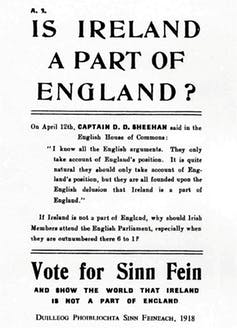Life
1873-1948 [Captain Daniel Desmond Sheehan;] son of small farmers [peasants]; experienced eviction in infancy; contemporary of James Joyce at college; later entered the bar, and acted on behalf of tenants in relation to the Land Commission, 1903; elected a Nationalist MP; m. Pauline O’Connor, 1894, with whom five children; issued Ireland Since Parnell (1931), which praises the lost leader - arguing that ‘if there had not been an almost unbelievable concatenation of errors and misunderstandings and stupid blunderings, Parnell need never have been sacrificed’ - and strenuously supports William O’Brien [q.v.] against John Dillon, et al., identifies Carson with recalcitrant Orangeism, castigates Lloyd George, and expresses hopes of Irish reunification after Partition and Carson’s appointment as Lord of Appeal; he was one of the few members of the Irish Parliamentary Party who actually enlisted in World War I, in which he lost two sons and a nephew; d. 28 Nov. 1948.

|
[ top ]
Works
Ireland Since Parnell (London: D. O’Connor 1921), vii-viii, 326pp. [see extracts, infra, or full-text copy, full attached.]
Criticism
See John O’Donovan, ‘Daniel Desmond Sheehan (1873-1948) and the Rural Question in Cork, 1894-1910’, in Defying the Law of the Land: Agrarian Radicals in Irish History, ed. Brian Casey (Dublin: History Press 2013) [Chap. 11].
[ There is an extensive Wikipedia entry - online; accessed 28.009.2014.]
[ top ]
Quotations| Ireland Since Parnell (1931) |
From 1885 to 1890 there was a general forgiving and forgetting of historic wrongs and ancient feuds. The Irish Nationalists were willing to clasp hands across the sea in a brotherhood of friendship and even of affection, but there stood apart, in open and flaming disaffection, the Protestant minority in Ireland, who were in a state of stark terror that the Home Rule Bill of 1886 meant the end of everything for them - the end of their brutal ascendancy and probably also the confiscation of their property and the ruin of their social position.
|
| See longer extracts - as attached. Full text available at Gutenberg - online; quoted in part in an article in defence of conspiracy theories, at Indymedia, 14 Sept. 2007 - online; accessed 09.11.2011; URL emended 28.09.2104. |
The Playboy of the Western World - Sheehan’s contribution to the debate at the Abbey Theatre on 4 Feb. 1907, following the riots at the first performances is documented by Richard Ellmann in a footnote to James Joyce’s letter on the fracas to his brother (written in Rome and based on the report in Freeman’s Journal): ‘Daniel Sheehan (whom Joyce had known at University College) spoke, as a peasant now working for a medical degree in Dublin, in defend Synge’s play. He said, in part: “Mr. Synge had drawn attention to a particular form of marriage law which, though not confined to Ireland, was very common in Ireland. It was with a fine woman like Pegeen Mike and a tubercule Koch’s disease man like Shaun Keogh - and the point of view was not the murder at all, but when the artist appears in Ireland who was not afraid of life and his nature, the women of Ireland would receive him.’ The newspaper reported that “[a]t this stage in the speech many ladies, whose countenances plainly indicated intense feelings of astonishment and pain, rose and left the place. Many men also retired.” An earlier phrase of Sheehan’s about Irishwomen was “lost in the noise”.’ (Selected Letters of James Joyce, ed. Richard Ellmann, London: Faber 1975, p.147, n.3 [appended to letter of 11 Feb. 1907.])
Further: ‘Sheehan also said he came “to object to the pulpit Irishman, just as they objected to the stage Irishman”’. (Ibid., n.4.) Joyce writes: ‘Sheehan seems to be a little different from the other young men with ideas in Ireland. I suspect he must have got a high place in all his exams and so can afford to treat the Church on equal terms.’ [For full text of Joyce’s letter on the incident, see under Joyce, Quotations, infra.]
[ top